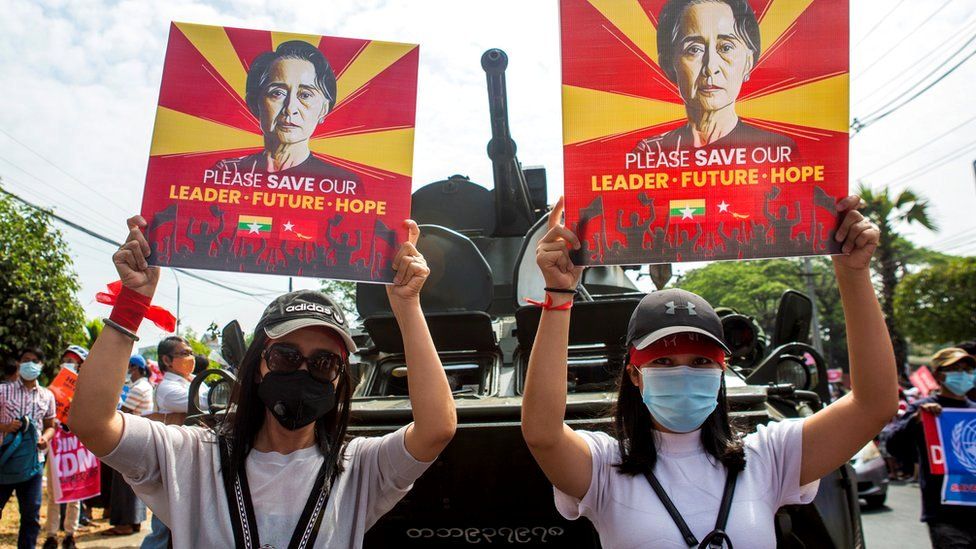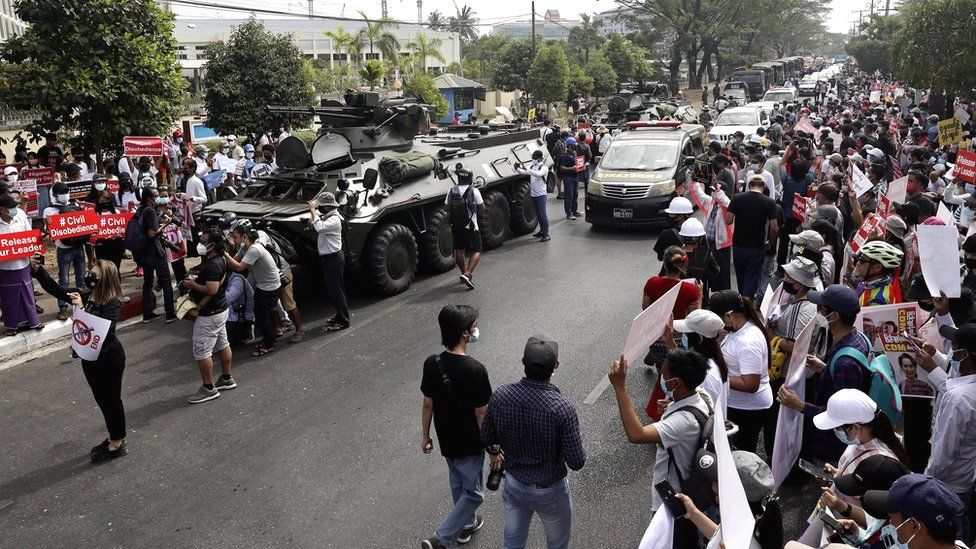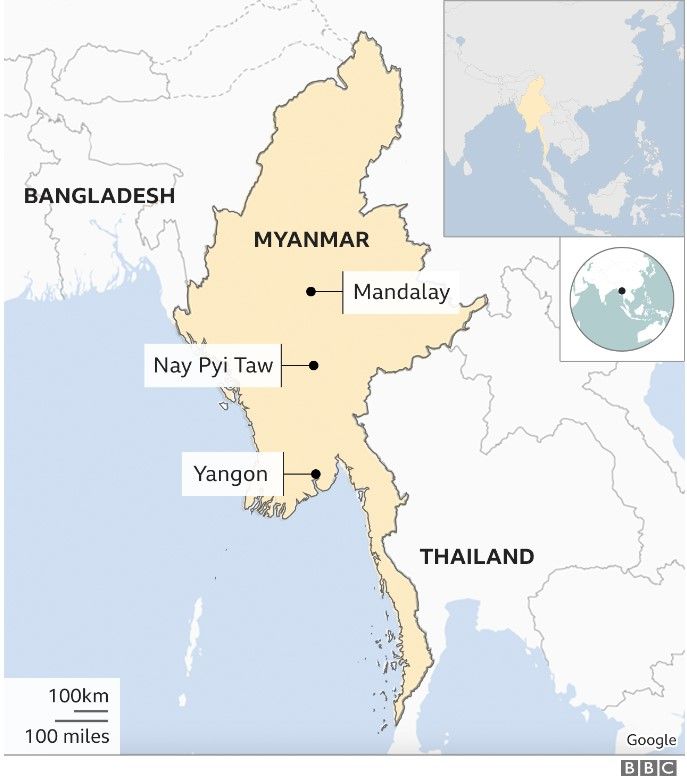Myanmar coup: Protesters face up to 20 years in prison under new law
 image copyrightReuters
image copyrightReutersMyanmar's military has warned anti-coup protesters across the country that they could face up to 20 years in prison if they obstruct the armed forces.
Long sentences and fines will also apply to those found to incite "hatred or contempt" towards the coup leaders, the military said.
The legal changes were announced as armoured vehicles appeared on the streets of several cities.
Hundreds of thousands of people have taken part in protests in recent days.
The demonstrators are demanding the release from detention of their elected leaders, including Aung San Suu Kyi, and the restoration of democracy in Myanmar, also known as Burma.
On Monday, Ms Suu Kyi's lawyer said she would be detained for a further two days. She will then be tried via video link at a court in the capital Nay Pyi Taw on Wednesday, Khin Maung Zaw added.
Ms Suu Kyi was rounded up with other members of the government on 1 February, but her detention was due to end on 15 February, according to Reuters news agency.
The charges against her include possession of unlawful communication devices - walkie-talkies used by her security staff.
Her party was elected in a resounding victory last November, but the military has alleged voter fraud without providing proof.
What are the signs of a crackdown?
The military's heightened presence is the latest sign of a potential crackdown on opposition to the coup.
The ruling junta has also announced a series of legal changes, imposing long prison sentences and fines on anyone found to incite hatred towards the military, "by words, either spoken or written, or by signs, or by visible representation".
In a statement posted on a military website on Monday, it said that people preventing the security forces from carrying out their duties could face seven years in jail, while those found to stir up fear or unrest in public could be imprisoned for three years.
 image copyrightEPA
image copyrightEPAThe news came hours after the internet was restored. Telecoms operators said they had been told to shut off services from 01:00 to 09:00 local time, Sunday into Monday (18:30 to 02:30 GMT).
Across the country on Sunday, hundreds of thousands of protesters rallied against the military for the ninth day in a row.
In the city of Myitkyina, in Kachin state, shooting could be heard as security forces clashed with anti-coup demonstrators. It was not clear whether rubber bullets or live rounds were being fired.
Five journalists were among those arrested, but were later released.
In Yangon, armoured vehicles were seen on the streets for the first time since the coup. Monks and engineers led a rally there, while motorcyclists drove through the streets of Nay Pyi Taw.
A doctor at a hospital in Nay Pyi Taw told the BBC the security forces were carrying out night-time raids on homes.
"I'm still worrying because they [made] a curfew statement... not to go outside between 20:00 and 04:00, but this makes a time for the police and soldiers to arrest people like us," said the doctor, who cannot be named for safety reasons.
"The previous day they [broke] into the house, cut down the fence, entered and arrested people unlawfully. That's why I'm also worrying."
An office of the US embassy in Yangon warned US nationals to stay indoors during curfew hours.

On Saturday, the military said arrest warrants had been issued for seven prominent opposition campaigners and warned the public not to harbour opposition activists fleeing arrest.
Video footage showed people reacting with defiance, banging pots and pans to warn their neighbours of night-time raids by the security forces.
The military on Saturday also suspended laws requiring court orders for detaining people longer than 24 hours and for searching private property.
What is the rest of the world saying?
UN Secretary-General Antonio Guterres said he was "deeply concerned" about reports of the use of excessive force by security personnel and "the reported deployment of additional armoured vehicles to major cities".
Mr Guterres urged Myanmar's military leaders to "ensure the right of peaceful assembly is fully respected and demonstrators are not subjected to reprisals", according to a statement released by his office on Sunday.
Tom Andrews, the UN special rapporteur on Myanmar, accused the military of "declaring war" on the people and said the generals were showing "signs of desperation" and would be held accountable.

Western embassies urged the military to show restraint.
A statement signed by the EU, the US and the UK said: "We call on security forces to refrain from violence against demonstrators, who are protesting the overthrow of their legitimate government."

Myanmar - the basics
- Myanmar, also known as Burma, was long considered a pariah state while under the rule of an oppressive military junta from 1962 to 2011
- A gradual liberalisation began in 2010, leading to free elections in 2015 and the installation of a government led by veteran opposition leader Aung San Suu Kyi the following year
- In 2017, a deadly crackdown by Myanmar's army on Rohingya Muslims sent more than half a million fleeing across the border into Bangladesh, in what the UN later called a "textbook example of ethnic cleansing"
- Aung San Suu Kyi and her government were overthrown in an army coup on 1 February following a landslide NLD win in November's elections





No comments